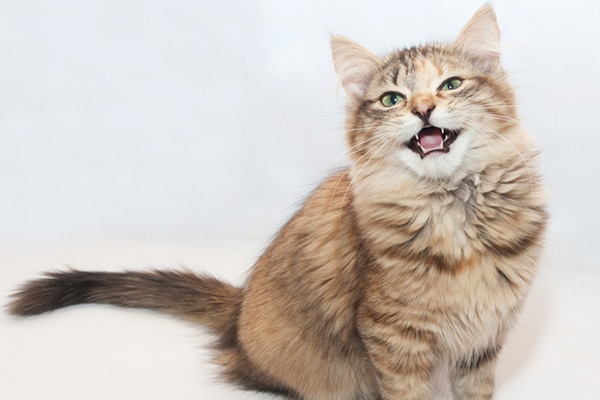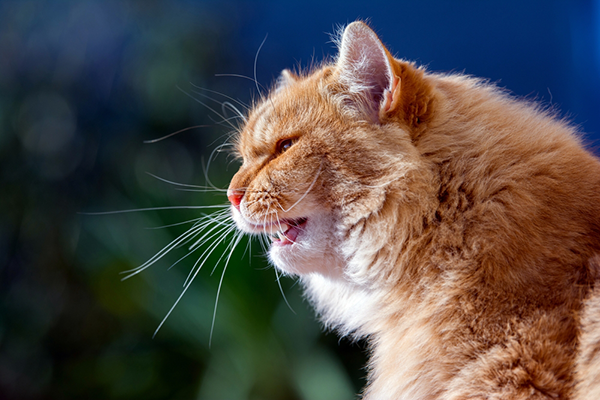We all know that some cat breeds meow more than others (Siamese, anyone?), and some cats just enjoy making noises. But if your cat won’t stop meowing, a vet check might be in order. So, why do cats keep meowing? Here are some reasons for that constant cat meowing:

Your cat might be meowing if she’s in heat. Photography by annadarzy/Thinkstock.
1. All that cat meowing means your cat is in heat.
If your five- or six-month-old un-spayed cat won’t stop meowing, your cat might be in heat. Cat in heat sounds are eerily loud and almost sound as if the cat is in pain, and they’re usually accompanied by super-affectionate behavior and an odd, sway-backed position when you pet near the rump.
2. Excessive cat meowing could signal hyperthyroidism.
Typically found in older cats, hyperthyroidism displays a number of symptoms, including weight loss despite ravenous hunger, excessive activity and excessive vocalization. If your cat is showing these symptoms and your cat won’t stop meowing, take her to the vet right away for a checkup and blood test.
Related: What Do Different Cat Meow Sounds Mean?
3. If your cat won’t stop meowing, it could signal loss of vision and/or hearing.
If your older cat won’t stop meowing once you’ve turned off the lights and gone to bed, she may really feel lost. A cat who’s partially blind or deaf won’t be able to make her way through the house and may not be able to hear you.
4. Senile cats meow a lot.
Yes, cats can become senile. This condition, known as feline cognitive dysfunction or cat dementia, can cause a number of problems that will leave your cat feeling scared and disoriented. Her response will be wails, yowls and excessive cat meowing. A cat with cognitive dysfunction may also become more irritable, sleep more or have altered sleep cycles, lose coordination, and even on occasion become incontinent.
5. If your cat won’t stop meowing, she could have feline hyperesthesia syndrome.
A cat with this condition will sometimes get wild-eyed and just go nuts, almost as if she’s hallucinating. She’ll cry and yowl loudly, may have bizarre mood swings, her skin may ripple as if even the air hurts her, and she might have sudden fits of grooming herself like crazy, even leading to hair loss.
6. Cat meowing might signal pain.
A cat will rarely show pain, but sometimes when she’s really hurting, a cat won’t stop meowing. I saw this once when my cat had a urinary tract infection: she ran back and forth to the litterbox and tried to pee, but nothing came out and the effort was so painful she cried. (Of course, she went right to the vet after I saw this behavior!)
7. Your cat is meowing due to loneliness or boredom.
Single cats who are very closely bonded with their caretakers are particularly susceptible to loneliness or boredom. This kind of constant cat meowing or crying usually starts after you go to bed and continues until you respond or she gets tired of calling out for attention. If a cat won’t stop meowing because she’s lonely, these tips from the ASPCA may be helpful. Or, consider adopting a second cat.
Top photograph: Shutterstock.
Originally published in 2017.
